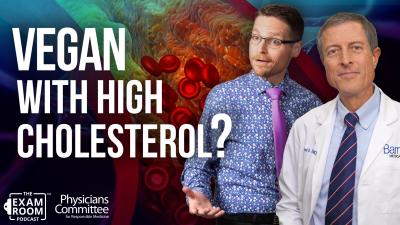Federal Court Dismisses Physicians Committee Lawsuit Over Industry Influence on Food Policy
Doctors Seek to Eliminate Industry Influence, Issues Remain Undecided

WASHINGTON—A federal court has ruled that a lawsuit filed by the Physicians Committee against the federal government over undue industry influence in nutrition policy cannot be decided on the basis of federal law and is therefore dismissed. In a complaint filed in January, the Physicians Committee had alleged that the U.S. Department of Agriculture (USDA) and the Department of Health and Human Services (HHS) allowed the food industry to dictate the Dietary Guidelines Advisory Committee’s (DGAC) new recommendations on cholesterol.
The court ruled, however, that there are no guidelines for determining how much industry influence is too much. As a result, the Physicians Committee’s complaint was “non-justiciable.”
Several DGAC members came from institutions that were funded by the egg industry and relied on egg-industry-funded research findings when it removed limits on dietary cholesterol earlier this year. The lawsuit alleged that in allowing this to happen, the USDA and HHS violated the Federal Advisory Committee Act, which mandates that the advisory committee “will not be inappropriately influenced by the appointing authority or any special interest.”
According to previously unreleased documents obtained by the Physicians Committee under the Freedom of Information Act, the American Egg Board had directly nominated one individual who was then placed on the DGAC. A second member was actively receiving egg-industry research grants according to industry documents, and two others worked at a university that had requested and received more than $100,000 from the American Egg Board for research aimed at challenging the cholesterol limits.
The DGAC then skipped its usual procedure of reviewing scientific studies and recommended that the cholesterol limit by dropped without an appropriate review of relevant research. Breaking with the Food and Drug Administration and the Institute of Medicine, both of which hold that cholesterol in eggs and other foods increases blood cholesterol levels, the DGAC reported in February 2015 that cholesterol is no longer “a nutrient of concern for overconsumption” and that “available evidence shows no appreciable relationship between consumption of dietary cholesterol and serum cholesterol.”
Ultimately, however, the final Dietary Guidelines for Americans, released in January 2016, reasserted the dangers of dietary cholesterol and called on Americans to eat as little cholesterol as possible, as the Physicians Committee had wanted. Even so, the dismissal of the Physicians Committee’s court case means there are no clear limits as to the food industry’s role in future nutrition policy decisions.
Media Contact
Jeanne Stuart McVey
202-527-7316
jmcvey[at]pcrm.org
Founded in 1985, the Physicians Committee for Responsible Medicine is a nonprofit organization that promotes preventive medicine, conducts clinical research, and encourages higher standards for ethics and effectiveness in education and research.








